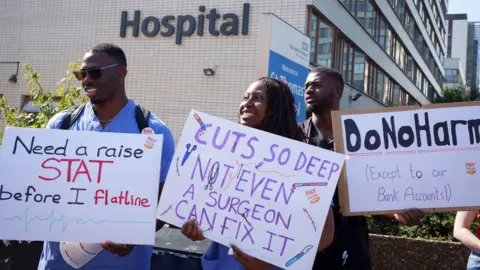The National Health Service (NHS) is facing an exceptionally taxing few days as it navigates through a significant doctors’ strike in England. Health Secretary Wes Streeting has highlighted that while the disruption caused by the five-day strike cannot be entirely mitigated, efforts are being made to keep its impact as minimal as possible. This industrial action, led by thousands of resident doctors, formerly known as junior doctors, commenced last Friday due to an impasse in negotiations between the government and the British Medical Association (BMA) regarding pay disputes.
The NHS aims to maintain as many non-urgent healthcare services as it can, urging patients to attend their appointments unless they receive notification of cancellations. However, the BMA has expressed concerns about the strain on staff, indicating that the existing workforce is already stretched too thin. As part of efforts to alleviate pressure on certain hospitals, the union has started authorizing specific requests for doctors to return to work from the picket lines, despite their ongoing strike.
One prominent example involves a doctor who was redirected to assist at Nottingham City Hospital’s neonatal intensive care unit, along with two anaesthetists who were requested to work at Lewisham Hospital in south London on Saturday. Notably, prior to this latest strike, which marks the twelfth since March 2023, the BMA had only approved five similar requests for doctors to work during strike periods.
While official figures detailing the implications of this current strike have yet to be released, some hospitals report successfully continuing over 80% of their non-urgent treatments. Senior doctors are stepping in to cover for resident doctors, and NHS England is encouraging the public to continue seeking care throughout the strike. GP surgeries will maintain regular hours, and both urgent care facilities and Accident & Emergency (A&E) departments will remain operational.
Wes Streeting asserted that the government will not allow the BMA to dictate terms and is committed to minimizing risks to patients. In a recent commentary published in the Times, Prime Minister Sir Keir Starmer urged resident doctors to refrain from following the BMA’s lead toward a path of detrimental strike actions, claiming that such actions lead to significant losses for the NHS and the wider community. Starmer’s remarks were made as doctors across England rallied at various hospitals, carrying signs demanding restoration of their pay.
Resident doctor Kelly Johnson, who participated in the protests at St. Thomas’ Hospital in London, expressed that criticisms of the strike as unjust feel deeply hurtful. She emphasized that the decision to strike is not made lightly and is born from a collective commitment to the public and the health service. Similarly, Cristina Costache, a paediatrics registrar at Leeds General Infirmary, shared that going on strike was a painstaking decision, reflecting her dedication not only to her patients but to the integrity of her profession.
Historically, strikes by resident doctors have previously generated mass cancellations of treatments and operations, with over one million appointments disrupted during strikes in March 2023 alone. However, this time around, NHS England has instructed hospitals to only cancel non-urgent work in truly exceptional circumstances.
Additionally, it’s crucial to note that the strike impact does not extend to Scotland, Wales, and Northern Ireland, as doctors in these regions are not part of the pay dispute. The discussions currently taking place between the government and the union primarily revolve around non-pay issues, such as working conditions and examination fees, as Streeting has firmly stated that pay will not be a subject of negotiation at this time. The BMA argues that despite an average pay rise of 5.4% this year, remuneration for doctors remains significantly lower than it was 15 years ago when adjusted for inflation.
In conclusion, the strike actions taken by resident doctors underscore a broader dialogue about the state of the NHS, the pressures faced by healthcare professionals, and the necessity for better remuneration and working conditions amid a backdrop of ongoing budgetary constraints and high demand for services. The outcomes of this strike may well shape the future landscape of healthcare in England and highlight the critical issues surrounding the compensation and treatment of the nation’s doctors.











